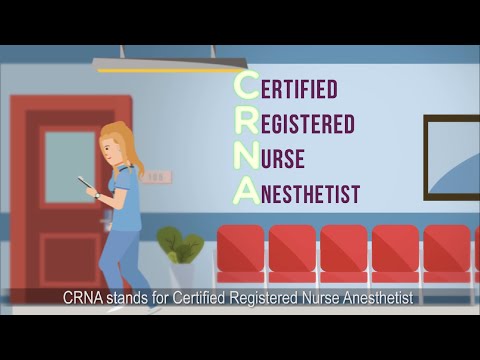High-Paying CRNA Jobs: Description and Salary

Certified Registered Nurse Anesthetist Job Description Template
Certified Registered Nurse Anesthetist Job Description A Certified Registered Nurse Anesthetist (CRNA) is an advanced practice registered nurse who specializes in providing anesthesia to patients during surgical procedures. They work alongside surgeons, anesthesiologists, and other healthcare professionals to ensure that patients are properly sedated and pain-free during their surgeries. The responsibilities of a CRNA include assessing patients’ medical histories, conducting physical examinations, and determining the appropriate anesthesia plan for each individual. They administer various types of anesthesia, such as general anesthesia, regional anesthesia, and local anesthesia, depending on the patient’s needs. During surgery, CRNAs closely monitor patients’ vital signs, adjust anesthesia levels as necessary, and manage any complications or side effects that may arise. They are trained to respond quickly to emergency situations and are skilled in resuscitation techniques. CRNAs also play a crucial role in the post-operative care of patients. They provide pain management and ensure patients are comfortable during the recovery period. They may also provide education and guidance to patients and their families on pain management techniques and potential side effects. One of the most important qualities of a CRNA is their attention to detail and ability to make quick decisions. They must have excellent communication and interpersonal skills to collaborate effectively with the surgical team and provide emotional support to patients. In conclusion, a Certified Registered Nurse Anesthetist is a highly skilled healthcare professional who plays a vital role in ensuring the safety and comfort of patients during surgical procedures. Their expertise in anesthesia administration and patient care is essential to the success of any surgical team.Certified Registered Nurse Anesthetist Responsibilities
Certified Registered Nurse Anesthetist Requirements
How Much Does A Certified Registered Nurse Anesthetist Make?
Certified Registered Nurse Anesthetist Salary
| Experience Level | Salary Range |
|---|---|
| Entry-level | $130,000 – $160,000 |
| Mid-career | $150,000 – $180,000 |
| Experienced | $170,000 – $200,000 |
| Senior | $190,000 – $230,000 |
A Certified Registered Nurse Anesthetist (CRNA) is a highly skilled and specialized advanced practice nurse who provides anesthesia care to patients. CRNAs play a crucial role in ensuring patient safety and comfort during surgical procedures. The salary of a CRNA can vary based on factors such as experience, location, and practice setting.
As shown in the table above, the salary range for CRNAs generally increases with experience. Entry-level CRNAs can expect to earn between $130,000 and $160,000 per year, while those in mid-career can earn between $150,000 and $180,000. Experienced CRNAs may earn between $170,000 and $200,000, while senior CRNAs can earn between $190,000 and $230,000 annually.
It’s important to note that these salary ranges are approximate and can vary depending on factors such as geographic location, additional certifications, and the specific healthcare facility or organization. CRNAs are highly valued members of the healthcare team and their expertise is in high demand.
Certified Registered Nurse Anesthetist Salaries by Country
Top Paying Countries for Certified Registered Nurse Anesthetist Salaries
| Country | Average Annual Salary (USD) |
|---|---|
| United States | $181,040 |
| Switzerland | $171,000 |
| Netherlands | $164,000 |
| Australia | $151,000 |
| United Kingdom | $134,000 |
A Certified Registered Nurse Anesthetist (CRNA) is a highly specialized healthcare professional who administers anesthesia to patients undergoing medical procedures. The table above showcases the top paying countries for CRNAs based on their average annual salaries. As shown, the United States offers the highest average annual salary for CRNAs at $181,040. Other countries such as Switzerland, Netherlands, Australia, and the United Kingdom also provide competitive salaries for this profession. These salaries reflect the value and demand for CRNAs in various healthcare systems around the world.
A video on the topic Certified Registered Nurse Anesthetist
Video Source : Nurse AnesthetistsInterview Questions for Certified Registered Nurse Anesthetist
1. Can you explain the role of a Certified Registered Nurse Anesthetist (CRNA)?
A CRNA is an advanced practice registered nurse with specialized training in administering anesthesia. They work closely with healthcare teams to provide safe and effective anesthesia care to patients before, during, and after surgical procedures.
2. What qualifications and education are required to become a CRNA?
To become a CRNA, one must first obtain a Bachelor of Science in Nursing degree and gain experience as a registered nurse. Then, they must complete a Master’s or Doctoral degree in Nurse Anesthesia, followed by passing the national certification exam administered by the National Board of Certification and Recertification for Nurse Anesthetists (NBCRNA).
3. What skills and qualities are important for a CRNA to possess?
CRNAs should have strong critical thinking and decision-making skills, as they are responsible for assessing patients, planning and implementing anesthesia care, and managing potential complications. They must also have excellent communication and interpersonal skills to collaborate effectively with patients and healthcare teams.
4. How do you ensure patient safety during anesthesia administration?
CRNAs prioritize patient safety by conducting thorough preoperative assessments, carefully monitoring vital signs and anesthesia levels during procedures, and promptly addressing any complications or adverse reactions. They also stay updated on current anesthesia techniques and best practices.
5. Can you describe a challenging situation you have encountered as a CRNA and how you resolved it?
One challenging situation I encountered was when a patient had an unexpected allergic reaction to a medication during surgery. I immediately stopped the medication, administered appropriate treatment to stabilize the patient, and communicated effectively with the surgical team to ensure their safety. Afterwards, I conducted a thorough review of the patient’s medical history to prevent similar incidents in the future.
6. How do you stay updated on advancements and changes in anesthesia practice?
I stay updated on advancements and changes in anesthesia practice by attending continuing education conferences, participating in professional organizations, and regularly reading relevant research articles and journals. Collaboration with colleagues and engaging in discussions about best practices also contribute to my ongoing education.
7. Can you discuss the importance of teamwork in the operating room?
Teamwork is crucial in the operating room as it ensures the smooth coordination of care and enhances patient safety. CRNAs collaborate closely with surgeons, nurses, and other healthcare professionals to provide comprehensive anesthesia care. Effective teamwork involves clear communication, mutual respect, and a shared commitment to the well-being of the patient.
8. How do you handle stressful situations in the operating room?
In stressful situations, I remain calm and focused by relying on my training and experience. I prioritize patient safety, communicate effectively with the team, and take necessary steps to resolve the situation. I also make sure to debrief and reflect on the experience afterwards to learn and improve.
9. Can you discuss the importance of patient education in the anesthesia process?
Patient education is essential in the anesthesia process as it helps alleviate anxiety, promotes patient cooperation, and facilitates informed decision-making. As a CRNA, I take the time to explain the anesthesia procedure, potential risks and side effects, and answer any questions the patient may have. This empowers the patient to actively participate in their own care.
10. What do you find most rewarding about being a CRNA?
One of the most rewarding aspects of being a CRNA is the ability to provide immediate relief and comfort to patients undergoing surgery or other procedures. Knowing that I play a vital role in ensuring their safety and well-being brings me a great sense of fulfillment. Additionally, being part of a dedicated healthcare team and witnessing successful outcomes further enhances the satisfaction of my work.






